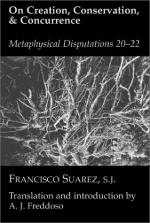|
This section contains 14,183 words (approx. 48 pages at 300 words per page) |

|
The word universal, used as a noun, has belonged to the vocabulary of English-writing philosophers since the sixteenth century, but the concept of universals, and the problems raised by it, has a far longer history. It goes back through the universalia of medieval philosophy to Aristotle's τὰ καθόλου and Plato's ἐίδη and ἰδέαι. Indeed, Plato may be taken to be the father of this perennial topic of philosophy, for it is in his dialogues that we find the first arguments for universals and the first discussion of the difficulties they raise. Plato believed that the existence of universals was required not only ontologically, to explain the nature of the world that as sentient and reflective beings we experience, but also epistemologically, to explain the nature of our experience of it. He proposed a solution to his problem, but he also recognized the objections to his particular...
|
This section contains 14,183 words (approx. 48 pages at 300 words per page) |

|


